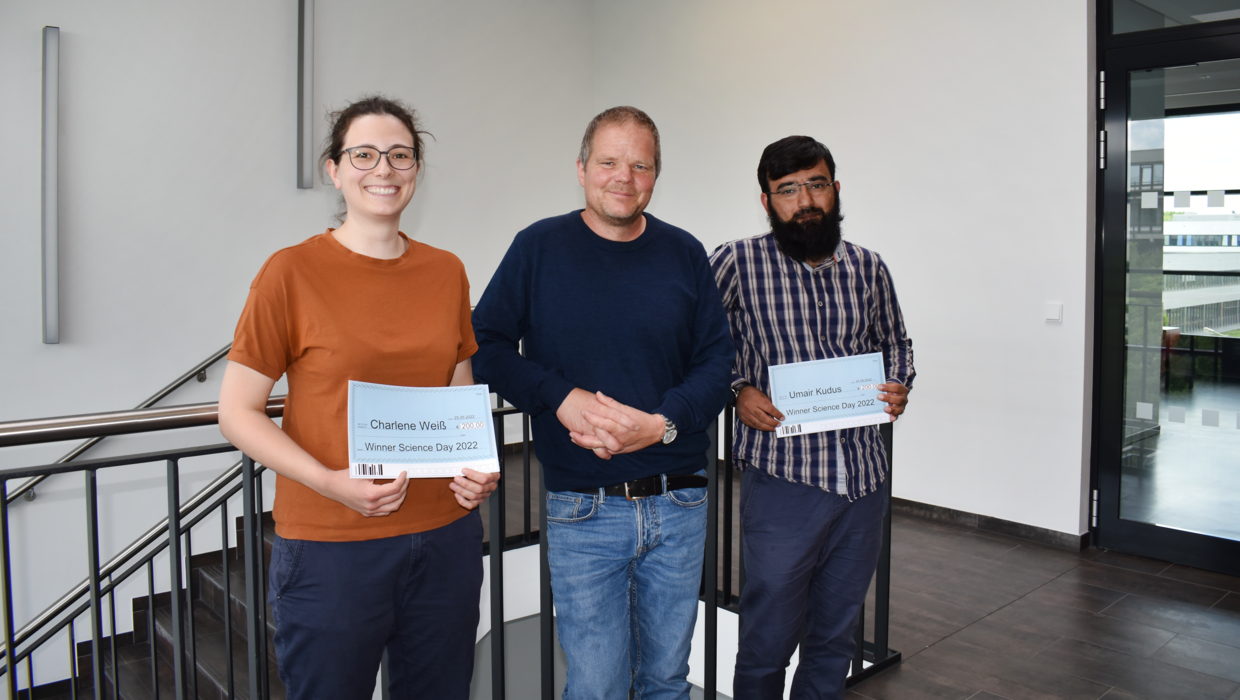After a break of two years, the Science Day of the Faculty of Electrical Engineering, Computer Science and Mathematics took place again on May 25, 2022. In this fourth event in this series, PhD students of the faculty could present their own PhD topic in six minutes. In an informal atmosphere, colleagues who are themselves on their way to a doctorate, were able to follow the different topics and research approaches.
After the presentations, including a Q&A session, there was a small get-together where people could discuss the presented research topics in more detail during a cold buffet. The award ceremony then took place as a special highlight, during which, the prize of 200 euros was shared between Charlene Weiß and Umair Qudus. Umair Qudus from the Data Science department demonstrated convincing arguments with his presentation on "Fact-checking using knowledge graphs". After the event he commented, "The science day event was an excellent opportunity for students of the University of Paderborn to showcase our research projects. We had fruitful discussions on research projects with other researchers from different disciplines. Such multi-discipline events help us to think out of the box on our research ideas".
The lecture "From Dobble to streaming videos" by Charlene Weiß from the Department of Discrete Mathematics was also well-received by the audience. She similarly concluded, "the Science Day was a very good exercise to make my abstract PhD topic from mathematics accessible to a broad audience. It is a nice event to provide PhD students with lecture opportunities of this kind and to broaden the exchange between institutes." (An abstract about the two talks can be found following this message).
Dr. Markus Holt, Managing Director of the Faculty of Electrical Engineering, Computer Science and Mathematics, presented the winners with their certificates and prize money and is looking forward to hosting the event series again next year. Applications will be available from April 2023.
Abstract Charlene White:
In today's digital communication, so-called codes are used to ensure efficient storage and transmission of information, e.g., when streaming videos. My talk was about special codes that have connections to beautiful combinatorial objects. These objects also appear in the social game "Dobble". In my PhD thesis I showed that these special objects do not exist in certain structures and therefore cannot be used as codes. As an alternative, I constructed other new codes.
Abstract Umair Qudus:
Any data publisher can make RDF knowledge graphs available for consumption on the Web. This is a direct consequence of the decentralized publishing paradigm underlying the Data Web, which has led to more than 150 billion facts on more than 3 billion things being published on the Web in more than 10,000 RDF knowledge graphs over the last decade. However, the success of this publishing paradigm also means that the validation of the facts contained in RDF knowledge graphs has become more important than ever before. Several families of fact validation algorithms have been developed over the last years to address several settings of the fact validation problems. In my research, we consider the following fact validation setting: Given an RDF knowledge graph, compute the likelihood that a given (novel) fact is true. None of the current solutions to this problem exploits hybrid solutions in ensemble learning settings. We propose a hybrid approach that exploits the diversity of existing families of fact-checking approaches within an ensemble learning setting to achieve a significantly better prediction performance.

